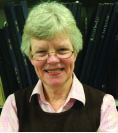When we think of “Choate Archives,” we likely envision some dark attic from which critical pieces of historical information appear magically at command. Many of us may not realize the great time and energy required to collect and maintain the artifacts that comprise Choate Rosemary Hall’s history. In fact, the Archives is one of the warmest and friendliest places on campus, thanks to Ms. Judy Donald ’66— Choate’s archivist and an alumnus of Rosemary Hall. Ms. Donald recently sat down with The Choate News in hopes of demystifying the school’s secret vault.
What was your time like at Rosemary Hall?
I was a day student, so my daily challenge was to arrive on time for the required 8 a.m. service in our beautiful St. Bede’s Chapel. At least I didn’t have to fret about what to wear each morning because we all wore uniforms. We just hoped they were clean and more or less ironed. (Come and check them out in the Archives!)
Our curriculum was more structured—two years of Latin was required, for example, with fewer electives and advanced courses. Afternoons were spent, as now, with sports, but with an added twist. In addition to varsity sports, every girl was a member of the “R” Team or the “H” Team, and there were intramural competitions throughout the year, complete with cheerleaders.
How did you start working for Choate?
Of course, I was attracted to the Archives because I am an alumna of Rosemary Hall. Pretty quickly, I found that people can be swept up in history of this institution, and I was one of them. I moved back to Connecticut in the mid-1990s, and someone suggested that I go and see how the Archives operated. I did, and I met Mrs. Lee Sylvester, the archivist at the time. I ended up working with her as a volunteer, and I learned how the Archives operated for about three years. When Mrs. Sylvester retired, I was hired to take her place. That was in 2001.
Describe a typical day.
My primary duty is to be a steward of the Archives collection. The collection ranges from documents to photographs to uniforms that help illuminate the history of the schools. Yes, it’s plural, the schools: Rosemary Hall, the Choate School, and Choate Rosemary Hall. All three of them are in here.
I respond to research inquiries from students, and I think that is very important because an archive, particularly in an independent school, should not be a museum. Students, faculties, alumni, and anybody should feel that they have access to it and can learn something from it or get an answer to whatever question that they have. That’s what makes this place a living treasure.
Another aspect of this job is expanding the archive collection. The Archives collects news stories and other things every day. I get boxes from faculty who are retiring, or alumni donate some things. I also look for things on eBay. My latest acquisition was a scrapbook from 1924; it was wonderful. I am always on a lookout for things, and that makes this place ever-changing.
What is the oldest document in the Archives?
The Archives has, alas, very few examples from the 1890s, when the schools were founded. There is a scrapbook from the 1890s that show some pictures, a photo album, newspaper accounts, and an ad for Rosemary Hall, which had pictures of the school. It’s not much — either the documents were not saved or were simply lost. I am ever hopeful that something is going to show up. You never know: those lost goods could be hiding in an attic or a closet somewhere.
What is the most interesting thing that you have come across in the Archives so far?
There once was a dairy farm on this campus right about where the Paul Mellon Arts Center is today. What better way is there of showing a dairy farm existed than a milk bottle? [Ms. Donald holds up a pint-size, glass milk bottle, with “Choate Wallingford” emblazoned on its side.] Isn’t that fascinating? What’s this worth? For anybody else, it’s just a glass bottle. To us, it’s priceless. It’s a wonderful artifact of our past.
Objects can be a very simple but meaningful; they are fun with good stories behind them. We can never forget, though, that it’s documents — whether it’s the minutes of the Trustee meetings or the papers of the Headmaster — that tell the history of the school, how decisions are made, and how it has moved from one year from another.
What do you do outside of Choate?
I enjoy reading books and watching operas. I also enjoy playing piano, word games, jigsaw puzzles, and golf. This job is only during the academic year, so I have summers off. During the summer, I head to Maine, a place I truly enjoy.
What should students know about the Archives?
It should be on the bucket list of every sixth former to stop at the Archives.





